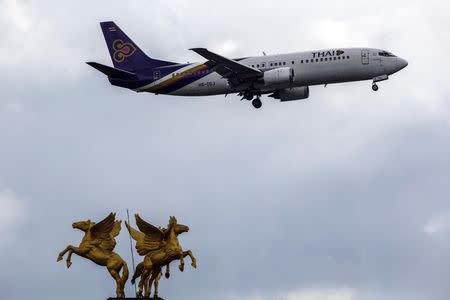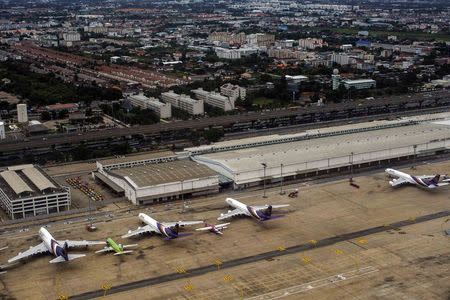Thai Airways reform to test business credentials of military government
By Khettiya Jittapong and Amy Sawitta Lefevre BANGKOK (Reuters) - Thailand's new military rulers have singled out the country's troubled flagship airline as the first state enterprise to undergo reform, an exercise that will test their unproven business acumen and ability to separate politics from business. Thai Airways International Pcl has racked up four quarters of losses due to declining ticket sales, high operating costs and ruthless competition. Boardroom fights have also led to slow decision-making and a lack of coherent strategy, sources in the company say. The junta led by General Prayuth Chan-ocha has told the chief of the Royal Thai Air Force to fix the airline. Air Chief Marshall Prajin Juntong, who also oversees economic matters for the military government, said on Friday a detailed restructuring plan aimed at returning the carrier to profit will be considered by the board at a meeting on July 24. The success or failure of Prajin, who has little practical experience in running a business, will have wider implications for the government. The junta needs to assure foreign investors of its ability to manage the economy and that it is not out to merely weed out allies of previous prime ministers. "You are right in noting that Prajin is a military man with little experience in running a company," Monthon Satchukorn, a spokesman for the Thai Air Force and a Prajin aide, told Reuters in an interview. "Prajin is a man whom he (the junta leader) can trust," Monthon said. Prajin, who declined to be interviewed for this report, will be chairing the upcoming meeting with a smaller board this week. Five members have resigned since the junta came to power, reducing the board to 10 members. Among the five who left was Ampon Kittiampon, who had been accused by the Thai Airways union of interfering with management and influencing executives whom he had close ties with. Ampon, who resigned as chairman in March but had remained on the board, has denied any wrongdoing. Ampon was also the cabinet secretary under former Prime Minister Yingluck Shinawatra. Her government was overthrown by the junta in May following months of sometimes violent street protests aimed at ousting Yingluck. The other four board members include Adul Sangsingkeow, the national police chief under Yingluck's government. Four of the five who left have links with former Prime Minister Thaksin Shinawatra, the elder brother of Yingluck, a source at the airline said, declining to be named because of the sensitivity of the matter. Thaksin was removed in an earlier coup in 2006. A military-backed government later re-wrote the constitution to try to limit the political influence of the Shinawatra family. The junta's reshuffles within the civil service and its restructuring of the national police force - seen as a bastion of support for Thaksin - are part of efforts to dismantle his support base and ensure parties linked to him do not return to power, analysts say. 'MALICIOUS CANCER' Prajin said the restructuring of Thai Airways will proceed in two phases, with the first focusing on boosting the efficiency of services and their quality. Cost-cutting will kick in during the second phase. "We need to get rid of the excess fat for restructuring," Prajin said after a board meeting on Friday. The carrier shoulders too many expenses, such as paying taxes for employees who started working for the airline before 2004, Piyasvasti Amranand, a former president of the airline, told Reuters. "Thai Air has a malicious cancer inside the body," Piyasvasti said. "It has to be cured from the inside." Piyasvasti, sacked by Yingluck's government in June 2012, took the helm at the airline in October 2009. The former energy minister was credited for turning around the loss-making carrier, which swung back to a profit in 2009-2012. So far, the army-led government has not announced a concrete reform strategy, Piyasvasti said, adding that the recent removal of free air ticket privileges for board members has had little impact on bringing down costs. Free tickets for board members account for just 3-4 percent of the company's costs, while 25,000 employee-related expenses make up of 15-20 percent of the total, he said. PERSISTENT LOSSES A deteriorating bottom line has prompted investors to dump the airline's shares. Thai Airways' market value has dropped by a third in the past year to below $1 billion. Passenger traffic plunged 25 percent on year in May when the military seized power. Thai Airways, which has extensive routes to Europe and the rest of Asia, is due to report its earnings for the April-June quarter next month. For 2014, the 54-year old airline is expected to post a net loss of 8 billion baht compared with a 12 billion baht loss last year, according to Thomson Reuters SmartEstimates. Prajin aims to return the airline to profit in the second quarter of 2015. Union leader Dumrong Waikhni told Reuters the high level of debt the carrier has taken on is a concern, and its heavy dependence on agents to sell tickets is eroding the bottom line. About 90 percent of the airline's tickets are sold via agents, which take a cut from the sales, Dumrong said. The sprawling network of agents also means it takes months for fares to be adjusted to reflect changing market conditions, making Thai Airways less competitive than regional rivals like Singapore Airlines, Dumrong said. There were attempts to alter the system, he said, but regulations guarding state enterprises have made it difficult to change. The setting up of the Thai Smile unit has also raised worries about route cannibalization, Dumrong said. The budget carrier flies the same domestic routes as its parent. "We can't survive if we continue to operate like this," Dumrong said. Analysts say the airline also needs to revamp its marketing strategy and cut the size of its fleet to reflect passenger traffic. Before the military coup, the position of vice president for marketing used to change every six months due to politics, said a source with direct knowledge of the airline's operations. That has led to inconsistency in policy and marketing in what is a highly competitive sector, said the source, who declined to be named as he is not authorized to speak to the media. "Thai Air can't go bankrupt. It is symbolic. If any government lets the national carrier go bankrupt, it will undermine the government's stability," the source said. ($1 = 32.1400 Thai Baht) (Additional reporting by Manunphattr Dhanananphorn and Pisit Changplayngam; Editing by Ryan Woo)


